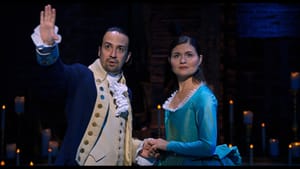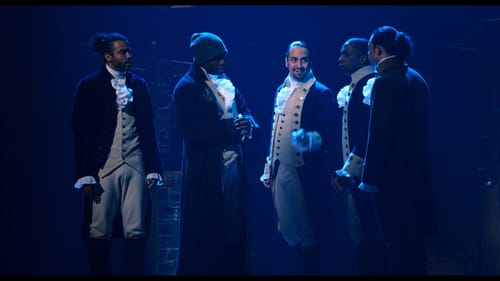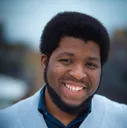Stay in the Loop
BSR publishes on a weekly schedule, with an email newsletter every Wednesday and Thursday morning. There’s no paywall, and subscribing is always free.
Who tells your story?
What responsibility does 'Hamilton' have to hip-hop, theater, and the communities they represent?

I have a nurturing relationship with hip-hop, but I can’t say the same for theater or American history. In fact, the latter two have held me in contempt, and it took digging before I found space within them that reflected my experience. Hamilton mashes all three together, and since its debut in 2015, the show hasn’t been sitting well with me. With the release of the original Broadway performance on streaming service Disney+, this was a chance to unpack my complicated feelings.
It’s in the music
I know relatively little about theater, and that has often given me a fresh approach in my reviews. In turn, theater has become one of my favorite formats, but my love for it comes with reservations. When Hamilton fever first hit, I grew confused. White women were reciting lyrics from this new musical all the time while I’m over here like—wait, that melody sounds a lot like a Notorious B.I.G. song. Was I the only one picking up on that? Probably. But I couldn’t handle the disappointment of asking said white women if they knew what songs “My Shot” referenced and hearing “no, I only know ‘Big Poppa’.”
“That’s the average Broadway theatergoer,” Lin-Manuel Miranda said in a 2015 interview with Rolling Stone. “If you were to create the median Broadway theatergoer, it’s a white lady between 45 and 55 years old who has an average income of $250,000 a year.”
Hip-hop culture penetrated the mainstream in the late 90s, about 25 years after its inception. While the audiences of hip-hop and theater haven’t converged much, I see parallels between both the origin stories and the futures of hip-hop and theater. Much of it is in response to capitalism and how it historically tramples the arts.
We’re talkin’ ‘bout hip-hop
In an interview with North Carolina Public Radio, hip-hop producer 9th Wonder talks about the responsibility of rhyming. “That’s been separated over the years,” he says. “Some people talk in rhyme and speak in rhyme and don’t think there’s a responsibility with it.” Hip-hop is a vehicle for anti-racism, for informing Black communities on political and racial issues in America, and for narrative expressions otherwise not explored in other mediums. By association, this makes hip-hop anti-colonialist and vocal against white supremacy.
“Sampling became possible because New York City public school systems in the 70s cut back on arts programming,” 9th Wonder continues. Students would take records, find the best parts of them, record them, and use that as a means to replace what instruments and equipment they didn’t have access to.
Hip-hop was born out of a response to government defunding the arts. Golly, that sounds familiar.

When a phenomenon like Hamilton happens, and it’s lauded for blending hip-hop and musical theater with American history, what’s being expressed and received appears dysfunctional. Hip-hop, theater, and American history, traditionally three factions at odds with each other, form a precarious alliance. It’s going to upset and disappoint its contrasting audiences for various reasons. Then why did Hamilton happen? Why attempt such a crossover? What’s Hamilton’s responsibility to hip-hop and the community the music represents?
Curtains for theater
Theater is one of the oldest surviving art forms, but it’s had its own battles—one of which it barely survived. In 1935, the Federal Theater Project (FTP) was established as part of the New Deal during the Great Depression. The project was meant to support theater artists who were out of work and struggling financially. Director Hallie Flanagan was an advocate for experimentation and innovation in theater and expanding its accessibility to all.
FTP’s funding was cancelled June 1939 in response to its pursuit of racially integrating theater. The initiative was deemed anti-capitalist and communist. If it weren’t for that pursuit, Hamilton wouldn’t have happened, albeit 80 years later. Nonetheless, it’s here, and that’s because of oppression.
Kind of like hip-hop.
Other plays like it, though, have failed. Holler if Ya Hear Me debuted on Broadway in 2014, a year before Hamilton. It was directed by Kenny Leon, who won the Tony Award for Best Director for A Raisin in the Sun. Leon has a storied career, but that alone wasn’t enough to sustain Holler on Broadway. One of the lead producers, Eric L. Gold, in a statement quoted by the New York Times, blamed the show’s closing on “the financial burdens of Broadway,” saying that he “was unable to sustain this production longer in order to give it time to bloom on Broadway.” The performance failed to fill 50 percent of its seats in its run, and received mixed reviews. Before the show’s close, Gold told Variety that “if we don’t succeed, it’s going to be difficult to do another rap or hip-hop show on Broadway.”
The NYT piece goes on to mention that maybe Hamilton will have better luck next year.

Hamilton is a pioneering step forward. Despite criticisms against it, it could have a major impact on future generations, just as films like Black Panther will for Black and Brown filmmakers, and just as figures from the golden age of hip-hop paved the way for more wide-reaching artists. Because let’s face it: the Tonys are as white as the Oscars and the Grammys, and the fight against that started nearly a century ago.
In the limelight ‘cause I rhyme tight
I sat down on Sunday night and finally watched Hamilton for myself. Coiled up from dense feedback I’d gotten from peers and what I’d read, I was expecting to come out on the other side with a bad taste in my mouth about the performance. But let me tell you: Hamilton is riveting. It’s so well-done that so much of the performance looks easy (is there a German word for when art does that?). The music is powerful, and by the end of it, I’d forgotten that I was watching a show about colonists in America. I was marveling at performers who looked like me, and that was the most important takeaway.
The show is not perfect. However, Hamilton is not a “documentary,” as historian Annette Gordon-Reed, who finds the show “problematic,” told The Harvard Gazette. It’s more of a “postmodern metatextual piece” of fanfiction that recants the story for the sake of reclaiming history.
The problems I have with Hamilton have nothing to do with the performance. I am frustrated that it takes this sort of retelling to elevate Black and Brown theater artists to prominence, something that should’ve happened a long time ago. I’m disconcerted with how the “average Broadway theatergoer” is oblivious to the hip-hop culture that informs Hamilton, and oblivious to how both hip-hop and theater are rooted in their desperation for survival and preservation, but are still co-opted and exploited instead of appreciated. I expect more support from theater producers who are good at talking about inclusivity, but terrible at executing such initiatives. And I am tired of the US government and its centuries-old efforts to dismantle the arts and the communities it represents.
The question to ask ourselves now is “who lives, who dies, who tells your story?”
What, When, Where
Hamilton is available to stream on Disney+.
Sign up for our newsletter
All of the week's new articles, all in one place. Sign up for the free weekly BSR newsletters, and don't miss a conversation.

 Kyle V. Hiller
Kyle V. Hiller